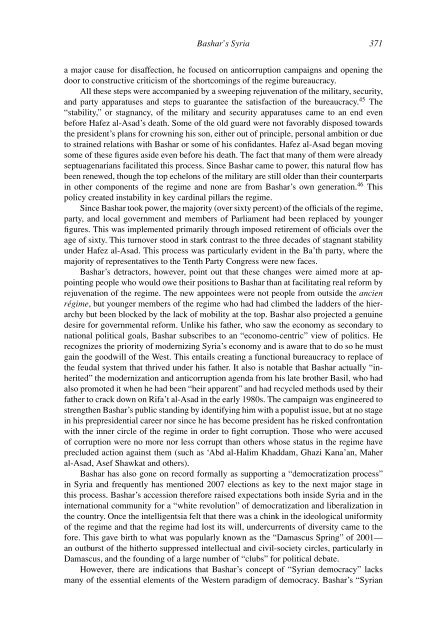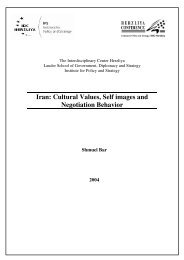Bashar’s <strong>Syria</strong> 371a major cause for disaffection, he focused on anticorruption campaigns <strong>and</strong> opening thedoor to constructive criticism of the shortcomings of the regime bureaucracy.All these steps were accompanied by a sweeping rejuvenation of the military, security,<strong>and</strong> party apparatuses <strong>and</strong> steps to guarantee the satisfaction of the bureaucracy. 45 <strong>The</strong>“stability,” or stagnancy, of the military <strong>and</strong> security apparatuses came to an end evenbefore Hafez al-Asad’s death. Some of the old guard were not favorably disposed towardsthe president’s plans for crowning his son, either out of principle, personal ambition or dueto strained relations with Bashar or some of his confidantes. Hafez al-Asad began movingsome of these figures aside even before his death. <strong>The</strong> fact that many of them were alreadyseptuagenarians facilitated this process. Since Bashar came to power, this natural flow hasbeen renewed, though the top echelons of the military are still older than their counterpartsin other components of the regime <strong>and</strong> none are from Bashar’s own generation. 46 Thispolicy created instability in key cardinal pillars the regime.Since Bashar took power, the majority (over sixty percent) of the officials of the regime,party, <strong>and</strong> local government <strong>and</strong> members of Parliament had been replaced by youngerfigures. This was implemented primarily through imposed retirement of officials over theage of sixty. This turnover stood in stark contrast to the three decades of stagnant stabilityunder Hafez al-Asad. This process was particularly evident in the Ba’th party, where themajority of representatives to the Tenth Party Congress were new faces.Bashar’s detractors, however, point out that these changes were aimed more at appointingpeople who would owe their positions to Bashar than at facilitating real reform byrejuvenation of the regime. <strong>The</strong> new appointees were not people from outside the ancienrégime, but younger members of the regime who had had climbed the ladders of the hierarchybut been blocked by the lack of mobility at the top. Bashar also projected a genuinedesire for governmental reform. Unlike his father, who saw the economy as secondary tonational political goals, Bashar subscribes to an “economo-centric” view of politics. Herecognizes the priority of modernizing <strong>Syria</strong>’s economy <strong>and</strong> is aware that to do so he mustgain the goodwill of the West. This entails creating a functional bureaucracy to replace ofthe feudal system that thrived under his father. It also is notable that Bashar actually “inherited”the modernization <strong>and</strong> anticorruption agenda from his late brother Basil, who hadalso promoted it when he had been “heir apparent” <strong>and</strong> had recycled methods used by theirfather to crack down on Rifa’t al-Asad in the early 1980s. <strong>The</strong> campaign was engineered tostrengthen Bashar’s public st<strong>and</strong>ing by identifying him with a populist issue, but at no stagein his prepresidential career nor since he has become president has he risked confrontationwith the inner circle of the regime in order to fight corruption. Those who were accusedof corruption were no more nor less corrupt than others whose status in the regime haveprecluded action against them (such as ‘Abd al-Halim Khaddam, Ghazi Kana’an, Maheral-Asad, Asef Shawkat <strong>and</strong> others).Bashar has also gone on record formally as supporting a “democratization process”in <strong>Syria</strong> <strong>and</strong> frequently has mentioned 2007 elections as key to the next major stage inthis process. Bashar’s accession therefore raised expectations both inside <strong>Syria</strong> <strong>and</strong> in theinternational community for a “white revolution” of democratization <strong>and</strong> liberalization inthe country. Once the intelligentsia felt that there was a chink in the ideological uniformityof the regime <strong>and</strong> that the regime had lost <strong>its</strong> will, undercurrents of diversity came to thefore. This gave birth to what was popularly known as the “Damascus Spring” of 2001—an outburst of the hitherto suppressed intellectual <strong>and</strong> civil-society circles, particularly inDamascus, <strong>and</strong> the founding of a large number of “clubs” for political debate.However, there are indications that Bashar’s concept of “<strong>Syria</strong>n democracy” lacksmany of the essential elements of the Western paradigm of democracy. Bashar’s “<strong>Syria</strong>n
372 S. <strong>Bar</strong>democracy” must be founded on <strong>Syria</strong>n history, culture <strong>and</strong> “personality.” In Bashar’s eyes,“Freedom <strong>and</strong> democracy are only instruments, just like stability. <strong>The</strong> goal is progress <strong>and</strong>growth.” 47 Along with this definition of the “proactive” goal of the regime, the “defensive”goal is preservation of “unity” <strong>and</strong> “stability.” Popular participation is manifested in theinvolvement of the people in promoting the country’s growth according to the plans of theregime, not in defining the very identity or nature of the regime. <strong>The</strong> instruments for popularparticipation are the same ones that the regime has used for decades for effecting socialcontrol.<strong>Syria</strong>, according to Bashar, is much too fragile for “instant democracy”; opening thedoor wide for freedom of speech is tantamount to permitting intercommunal conflict <strong>and</strong>chaos. Since the “unity” <strong>and</strong> “cohesion” of the people <strong>and</strong> the stability of the nation are theloftiest of national values <strong>and</strong> goals, the charge against members of the opposition is that theyimpinge on these very values in the service of foreign enemies of <strong>Syria</strong>. Western sponsorshipof a <strong>Syria</strong>n “civil society” is presented as an attempt to replace the indigenous <strong>Syria</strong>n “civilsociety,” based on government-regulated clubs <strong>and</strong> charities <strong>and</strong> tribal institutions, witha foreign concept. <strong>The</strong> result of such chaos will not be the victory of liberal forces thatthe West is trying to sponsor, but of radical Islamic forces that are lying in wait to takeadvantage of a breakdown of the regime. <strong>The</strong> cases of Algeria since the early 1990s <strong>and</strong> thecivil war in Lebanon <strong>and</strong> Iraq after the fall of the Ba’th regime are cited to prove the follyof uncontrolled democratization. In many of his meetings with western representatives, hehints at a period of 3–5 years needed to “prepare” <strong>Syria</strong> for democracy <strong>and</strong> asks for theWest to be forbearing with him, not to pressure him for reforms <strong>and</strong> to allow him to makeprogress toward democracy at a pace that su<strong>its</strong> the social <strong>and</strong> economic make-up of <strong>Syria</strong>.<strong>The</strong> “Damascus Spring” came to an end after less than a year. It was followed by “<strong>The</strong>Damascus Winter” of January 2002, with the arrest of <strong>Syria</strong>n intellectuals <strong>and</strong> parliamentarybackbenchers. <strong>The</strong> nature of the renewed suppression, however, was different from thatwhich <strong>Syria</strong> knew in the past; instead of summary arrests <strong>and</strong> disappearances of dissidents,the regime initiated public trials, albeit with forged evidence <strong>and</strong> predetermined verdicts,but open <strong>and</strong> with ostensible legal defense <strong>and</strong> media cover. In doing so it appears that theregime felt that it could ward off some of the international criticism of <strong>its</strong> actions.<strong>The</strong> emphasis on institutionalized repression, as opposed to the more arbitrary useof force that <strong>Syria</strong> was accustomed to, was also manifested in Bashar’s “anticorruption”campaign. Officials who had fallen from grace were accused of corruption. 48 Some weremade an example of through “due process,” while others were accused through leaks to theLebanese press, 49 but none were either summarily executed or surreptitiously incarcerated.<strong>The</strong> crackdown on civil society was accompanied by a declared “reactivation” of theBa’th party; members of the regional comm<strong>and</strong> council were sent to mobilize support forthe regime’s actions. Bashar’s reactivation of the party as a central instrument for achievinglegitimacy reflects his need to augment his legitimacy. Unlike his father, Bashar relieson the party <strong>and</strong> needs to coopt it. Moreover, the party plays an important role in Bashar’ssociopolitical worldview; he perceives it as occupying the societal space that the civil-societymovement claims for <strong>its</strong>elf. <strong>The</strong>refore, revitalization of the party is not a mere propag<strong>and</strong>aploy but an attempt to replace the civil-society movement with a government-controlled“civil society.”While the role of Bashar in initiating the reform process is not debated, his role in thedecision to put a halt to it is. Analysts sympathetic to Bashar <strong>and</strong> his reformist credentialshave interpreted the regime’s abrupt halt of the liberalization process as occurring for variousreasons. <strong>The</strong> main explanations include: (1) pressures on the president from the “old guard”<strong>and</strong> the Ba’th party, who feared a Gorbachev syndrome <strong>and</strong> dem<strong>and</strong>ed an immediate halt
- Page 4 and 5: Bashar’s Syria 355of political im
- Page 8 and 9: Bashar’s Syria 359a-Zur province
- Page 11: 362 S. Barof Lebanon, with which Sy
- Page 17 and 18: 368 S. Barnaturally come with the s
- Page 19: 370 S. BarSimilar behavior on the p
- Page 23 and 24: 374 S. Barcultural, political and m
- Page 25 and 26: 376 S. Barexcept for those with fam
- Page 27 and 28: 378 S. Barthe provisions for nonpro
- Page 29 and 30: 380 S. Bar The ups and downs in rel
- Page 31 and 32: 382 S. Barfamily is also linked by
- Page 33 and 34: 384 S. Bar2. The “second generati
- Page 35 and 36: 386 S. BarThe reformist trend withi
- Page 37 and 38: 388 S. Barwould allow the younger g
- Page 39 and 40: 390 S. BarFigure 3. Heads of the Sy
- Page 41 and 42: 392 S. Bar Disruption of the “hie
- Page 43 and 44: 394 S. Bar(Majlis Milli), composed
- Page 45 and 46: 396 S. Bar Other prominent Syrians
- Page 47 and 48: 398 S. BarSyrian civil society—su
- Page 49 and 50: 400 S. BarMany of the Muslim Brothe
- Page 51 and 52: 402 S. BarThese elements find reson
- Page 53 and 54: 404 S. BarIran’s proxy, Hezbollah
- Page 55 and 56: 406 S. BarWest—and specifically t
- Page 57 and 58: 408 S. BarBashar is well aware that
- Page 59 and 60: 410 S. BarBashar did not read these
- Page 61 and 62: 412 S. Bartoken withdrawal while ma
- Page 63 and 64: 414 S. Barlegitimacy had eroded. Ne
- Page 65 and 66: 416 S. Barin the wake of the al-Har
- Page 67 and 68: 418 S. BarIt was Russia, however, t
- Page 69 and 70: 420 S. Baror so, with competitive p
- Page 71 and 72:
422 S. Bar10. According to the well
- Page 73 and 74:
424 S. Bar44. See Flynt Everett, In
- Page 75 and 76:
426 S. Barinternet news site, all4s
- Page 77 and 78:
428 S. Bar100. As one Sunni Syrian
- Page 79 and 80:
430 S. Bar125. Radio Damascus, 21 O
- Page 81 and 82:
432 S. BarBengio, Ofra and Gabriel
- Page 83 and 84:
434 S. BarNews agencies and Newspap
- Page 85 and 86:
Regional Command;Central CommitteeR
- Page 87 and 88:
Main Figures in the Syrian Ba’th
- Page 89 and 90:
Main Figures in the Syrian Ba’th
- Page 91 and 92:
Main Figures in the Syrian Ba’th
- Page 93 and 94:
Main Figures in the Syrian Ba’th
















